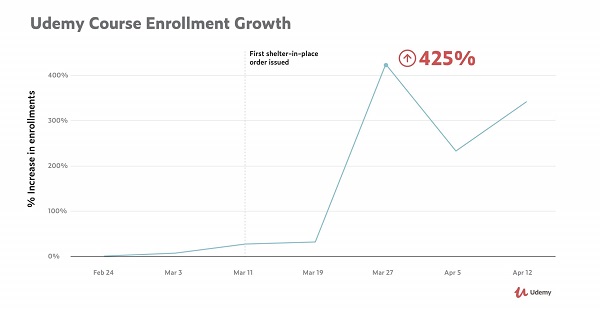It’s become trite to open an article with the words “in these uncertain times,” or “in this unprecedented crisis,” and yet, this is the reality we are all facing. Small business is suffering, with a 50% increase in bankruptcies compared to this time last year, and the number of unemployed Americans has topped 40 million.
It’s pretty clear that we are heading into a deep recession, if not a depression. More than ever, it’s vital for businesses to be agile and find new revenue streams. Diversification into educational products, moreover, has the added benefit of nurturing new audience members into becoming customers of your core business. When the economy reopens, they will remember to come to you first.
Yes, diversification is a business growth strategy, but it’s also a business survival strategy. Entering new markets, creating new types of products, or offering new services, spreads the risk to a business by spreading revenue across multiple sources. If one revenue stream dries up, others remain to keep your business afloat. While it was a good idea to diversify before COVID-19, the widespread impact of the pandemic is making diversification vital to survival.
Diversification can increase revenue, grow market share, and de-risk your business. But don’t lose sight of your core brand identity in the process – it’s important not to overextend or pursue projects that will require disproportionate resources. Finding products or services that leverage what you already have will reduce effort and cost while securing avenues for growth. Another important thing to keep in mind when diversifying your offerings is to take a long look at the market to identify where there is room for a new product or service that dovetails well with your existing business model.
Online Courses and COVID-19
One opportunity that has presented itself unexpectedly under COVID-19 lockdowns is selling online courses to your audience. With US unemployment in May having reached 19%, more people than ever are looking for new opportunities to keep busy, enrich their daily lives, and develop skills that will serve them in reentering the workforce.
The online course market is seeing a massive boom in sales. People around the world are staying productive, honing new skills, and learning to do things for themselves that they likely never imagined. From teaching algebra to self-hairstyling, limited access to services is propelling online education beyond any expectation.

Image source
With enhanced technology solutions, developing new revenue streams with online courses won’t require too much time or added investment, so you can hit the ground running. ClickMeeting, for example, is a webinar platform that can be easily set up for delivering media-rich course experiences.
The software integrates with ad retargeting and CRM platforms, features its own tools for automated pre-lesson reminders and post-lesson follow up, and can be set up for multi-lesson, on-demand student journeys using the open-source Moodle learning management system (LMS). As the company is quick to remind us, setting your business up with a line of course products to sell can be surprisingly light on resources.

Image source
According to research from Udemy, COVID-19 has brought a 425% increase in course enrollment, a 55% increase in course creation, and an 80% increase in course usage from businesses and governments. The dramatic surge in online learning is proving that the COVID-19 classroom isn’t just for homebound kids – adults are jumping on opportunities for learning en masse.
So what are you going to teach? Let’s take a look at some especially high-demand niches to consider – hopefully one will dovetail well with your current business.
Home Improvement and DIY
As Freedonia Group’s Impact Tracker reports, social distancing lockdowns are driving a huge increase in DIY purchasing. Among the most popular searches are building and reupholstering furniture, painting, and upcycling cabinets, shelves, and chairs. Lowe’s hardware stores confirms this trend, reporting a surge in sales on home improvement products.
With this increase in DIY and home improvement spending, consumers are also looking for tutorials on how to get their projects done properly.

Image source
Coronavirus is making America handy, presenting a big opportunity for online home improvement courses. If you sell products or supply services tied to home improvement or DIY, here are a few project types that are in especially high demand:
- Decks
- Build your own pool
- Gardening
- Baking and cooking
- Crafts
Professional Development
Executives and managers are going back to school in droves, taking advantage of the extra time and shifting landscape to hone new skills. Between 2020 and 2024, the market is projected to grow by $52.7 billion. With in-person corporate events, seminars, and training likely off the table for the near future, creating courses that deliver real business value is one way to diversify your revenue stream.
For marketing, biz dev, or HR leaders, there is a real opportunity to increase market share and amplify messaging by offering educational content online. Here are some popular professional development topics:
- Social media
- Transformative tech
- Business strategy
- Inclusive leadership
- Programming basics
Wellness and Self-Care
Gyms across the country are shuttered or operating with serious limitations, making it difficult for fitness aficionados to get an endorphin fix. With workouts confined to home, consumers are stocking up on fitness essentials like kettlebells, yoga mats and stationary bikes.
Online fitness and wellness programs are enjoying a lot of attention, propelling many brick and mortar fitness establishments to go digital, including well-known brands like Orange Theory, which launched a brand new platform for at-home workouts as studios across the country were forced to close.

Image source
While there are lots of free classes on YouTube, there is still a large market for more personalized solutions, including coaching and certification courses. If you sell products in the wellness sphere online, you may have experienced a boost in sales over quarantine as many Americans have used their spare time to step back and focus on self-care. Use this opportunity to develop online courses that either deliver an online version of your service or help your clients do it on their own with educational content.
- Meditation
- Fitness
- Massage
- Coaching and therapy
Beauty and Grooming
One of the most resilient industries weathering COVID-19 is the beauty industry. Barbers, hairdressers, hair removal, and nail salons have shifted to DIY with at-home results like #pandemicbangs trending on social media. Hair clipper sales increased 166% and hair coloring products rose 23%, from the same period last year, according to Nielsen, and McKinsey research confirms that home beauty and wellness-related shopping is getting a boost from global lockdowns.
The news is less optimistic for brick and mortar beauty salons. While long believed to be recession-proof, the pandemic is putting hairdressers and makeup artists out of business. One way to develop resilience is to pivot your skills to online tutorials, certification courses, or demonstrations to diversify your revenue until salons can reopen. Some areas for beauty grooming education content to consider:
- Haircutting and styling
- Nail care
- Makeup
- Hair removal
Today’s Students Are Tomorrow’s Customers
Aside from the immediate benefit of diversifying your business to online courses, this strategy is also an effective long game for capturing and nurturing new leads. Launching your course will help buffer against the impact of COVID-19 shutdown, but in the long term, this will not only be an added source of revenue but also a lead magnet.
Once you’re allowed to open up shop and consumers are back to buying, you’ll be able to count on your virtual students.

Image source: Created by the author via https://pablo.buffer.com/
Michael Brenner of Marketing Insider Group has said that in the pandemic, buyer behavior has shifted, so that today, “No one is buying, but everyone is learning.” But this won’t last forever, making it imperative to position yourself in the online course market quickly and with high-quality educational content.
Instilling trust, demonstrating authority, and delivering genuine value today will win you brand-loyal customers for years to come.
Closing Remarks
Online courses have become a major feature of the COVID-19 landscape. With people out of work and homebound, stores and businesses shuttered, and limited access to services, consumers are looking to learn new skills, execute projects that have been waiting for attention, and make time for self-care.
Utilizing the tool kit that you already have at your disposal to create authoritative and interesting virtual learning opportunities can diversify your revenue stream for increased resilience and decreased risk. And aside from the immediate advantages, creating online courses is also an effective way of capturing new leads that will be more likely to convert when the time comes to resume regular operations.
Birbahadur Singh Kathayat is an Entrepreneur, internet marketer and Co-founder of Lbswebsoft, a digital marketing company, and has 12 years in digital Marketing experience and helping some of the biggest companies build their brands and keep their reputation while increasing sales in the process. He is a writer and author on Socialmediaweek, Semrush, e27 and other publications.
Diversify Business stock photo by WIN12_ET/Shutterstock







